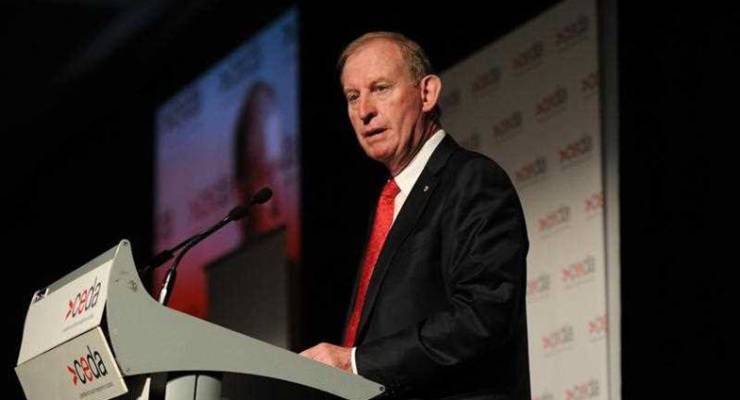
Every so often you’ll read a story about how Australians are terribly underinsured when it comes to life insurance. Such stories originate, unsurprisingly, with insurance companies. The scare stories don’t work, however, and Australians continue to blithely go about their business, uninterested in the purported dangers of being underinsured. The only reliable means of getting them to fork out for life insurance is to opt them into life policies as part of their superannuation and hope they don’t notice.
David Murray, of the financial services inquiry and, soon, “beleaguered” AMP, is similarly trying to scare people with his warning that the banking royal commission shouldn’t do anything that might make it more difficult or expensive for people to access financial advice, and shouldn’t take any action against the vertically integrated — or, as you might also call it, conflicted — model of financial planning and wealth management.
Given the revelations of the royal commission, fretting that senior Australians aren’t getting enough access to financial advice is like worrying teens aren’t getting enough access to alcohol. Murray evidently believes that the financial planning industry’s efforts to professionalise itself — and thus reduce the risk that customers will get dud advice — are perfectly adequate. “Reforms to this end are already in place, and time is needed to determine the outcomes of these existing reforms before additional regulation is considered.”
Exhibit A on that score, Sam Henderson, whose views once graced the very pages Murray’s words appear in today. Exhibit B, Dover Financial. Neither are with us any more, in a financial planning sense, courtesy of the royal commission. Neither were the detritus of the planning industry, the worst of the worst, either. Both were prominent players, industry heavyweights. The professionalisation of the industry, such as it is, did little or nothing about them. How Murray can seriously think, in the wake of the royal commission hearings, that the current professionalisation trajectory just needs a bit more time, is inexplicable.
Murray is also, famously, the father of vertical integration in Australian banking. Or more aptly, he will be the alpha and the omega, still defending it at the very end as he was present at the creation, insisting that the fundamental problems of conflicted advice can be regulated away — a ludicrous proposition given the performance of the purported consumer financial regulator, ASIC, which is still “standing ready” to intervene more than a decade after the case for blunt-force trauma-style regulation in financial planning was demonstrated.
That James “John Milton” Shipton’s “they also serve who only stand and wait” regulatory approach could ever address the profoundly skewed incentives that vertical integration creates is as silly as Murray’s denialism on financial planner professionalism. “You can’t regulate for culture,” Murray continues to insist. Actually, you can, as APRA has shown on Murray’s former bailiwick, the Commonwealth Bank. But Murray is at least right in the sense that ASIC certainly can’t regulate for culture. It can’t regulate much at all.








Murray isn’t the solution. Murray started the problem when he privatised the CBA so that his salary would be lifted to the level of the other leaners. Get him out of it, and nationalise the CBA, or expand the RBA to to be a retail player to keep the bastards honest.
That’s the core problem, isn’t it? The bastards aren’t honest. None of them. They’re greedy, nasty, selfish pieces of work driven only by the self-interest that is the centre of their creed.
That’s the core problem, isn’t it? The bastards aren’t honest. None of them. They’re greedy, nasty, selfish pieces of work driven only by the self-interest that is the centre of their creed.
How is BK in anyway legally qualified to dismiss life insurance as something families with a mortgage don’t need. That BK chooses to have or not have life insurance is his choice. But it is completely irresponsible to suggest that other families should not have such coverage. It’s no different to home and car insurance. An annoying cost of being a responsible adult. The broader issue of how much insurance products costs is a perfectly reasonable issue of debate. But not having life or proper car insurance can leave oneself, families and others destitute.
Does the term “moral hazard” mean anything to you?
Insurance is a waste of time, just handing over money for very poor coverage that the thieves try and wiggle out of any way.
Life assurance would be the ideal, every life will end sooner or later, why not be assured that your policy will pay back a healthy % to nearest and dearest?
But of course that is insane as insurance does not exist to pay anything back to its members/ uninformed
Along with reinventing the financial wheel in the form of a government bank – call it, I dunno, Bank of Common Weal or summat – we also need a government insurance entity, though a name for it would be difficult up with which to come… maybe GIO?
Rapacity is not a bug in the usury industry, it is a feature.
Totally agree we need a govt insurance company. But BK would be the first to oppose such given his pathological hatred of state owned enterprises.
If Murray can speak for the whole industry then the whole industry are climate change deniers too.
Murray always reminds me of Sir Desmond Glazebrook of Yes Minister fame, a muddle brained, upper class twit in charge of a bank. If we are going to regulate the banking system it will have to be by someone “the Chaps can trust”.
All forms of insurance are a scam. Health insurance? Spend my tax dollars on Medicare. Life insurance? Pay me the pension I am entitled to after paying taxes all my life.
Only your main assets: House, contents and car need insurance, and even the HAC is dubious depending on where you live.
Nationalise the insurance industry. Get a government willing to provide value for taxes paid.